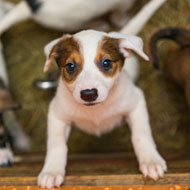Ban on third party puppy sales under consideration

BVA president John Fishwick said: “As vets we see first-hand the tragic consequences that can result from poorly bred puppies."
A ban on third party puppy sales is being considered by the government, environment secretary Michael Gove announced today (8 February).
Interested parties are being asked to share their views on a possible ban and how this could be introduced. Banning third party sales would mean anyone looking to buy or adopt a dog would either deal directly with the breeder or an animal rehoming centre.
Mr Gove commented: “We need to do everything we can to make sure the nation’s much loved pets get the right start in life. From banning the sale of underage puppies to tackling the breeding of dogs with severe genetic disorders, we are cracking down on sellers who have a total disregard for their dogs’ welfare.
“This is a further step to raise the bar on animal welfare standards. We are also introducing mandatory CCTV in all slaughterhouses and increasing maximum prison sentences tenfold for animal abusers.”
A raft of other measures to crack down on backstreet breeding, set out by the Prime Minister in December, were also laid in parliament today.
Coming into force later this year, the measures include a ban on selling puppies and kittens under eight weeks and compulsory licensing for anyone in the business of breeding and selling dogs. Puppy sales must also be completed in the presence of the new owner, and puppies must be shown with their mother before a sale is made.
The move has been welcomed by veterinary organisations and animal charities including the BVA, RSPCA, Mayhew and Battersea Dogs and Cats Home.
BVA president John Fishwick said: “As vets we see first-hand the tragic consequences that can result from poorly bred puppies so it’s encouraging to see the government announce this raft of measures to improve dog welfare.
“We support the principle that puppies should not be sold by third parties, but this is a complex area that must consider advertising, internet sales and pet owners’ buying habits to ensure illegal puppy sales won’t be driven underground.”
Mr Fishwick added that legislation must be backed by enforcement, so local authorities must be given adequate resources to guarantee dog welfare.
The government also recently consulted on plans to increase maximum prison sentences for animal abusers, from six months to five years.
Responses to the call for evidence on third party puppy sales must be received by 2 May 2018. To take part in the consultation, visit: https://www.gov.uk/government/consultations/banning-third-party-sales-of-pets-in-england-call-for-evidence



 The Veterinary Medicines Directorate (VMD) is inviting applications from veterinary students to attend a one-week extramural studies (EMS) placement in July 2026.
The Veterinary Medicines Directorate (VMD) is inviting applications from veterinary students to attend a one-week extramural studies (EMS) placement in July 2026.